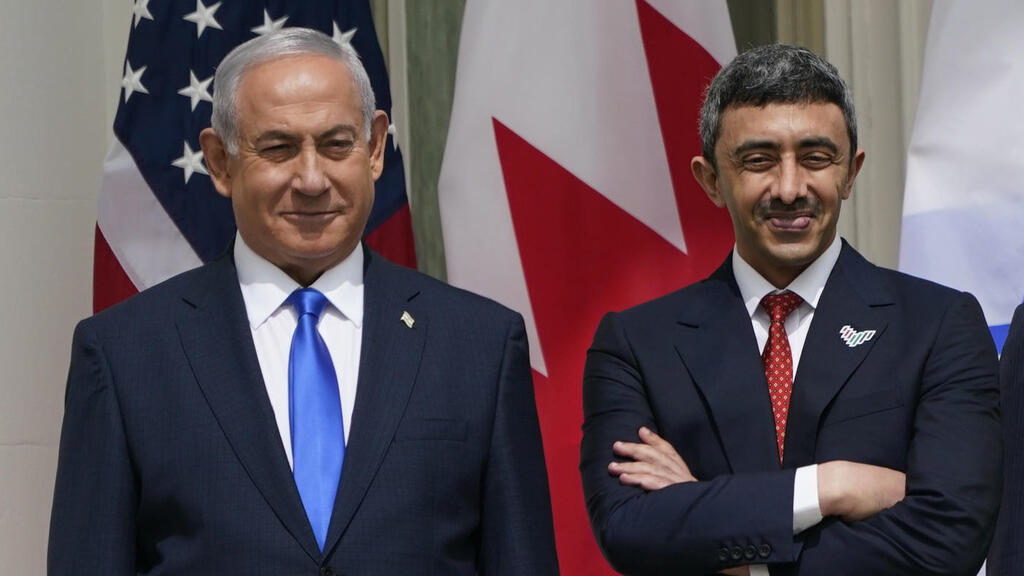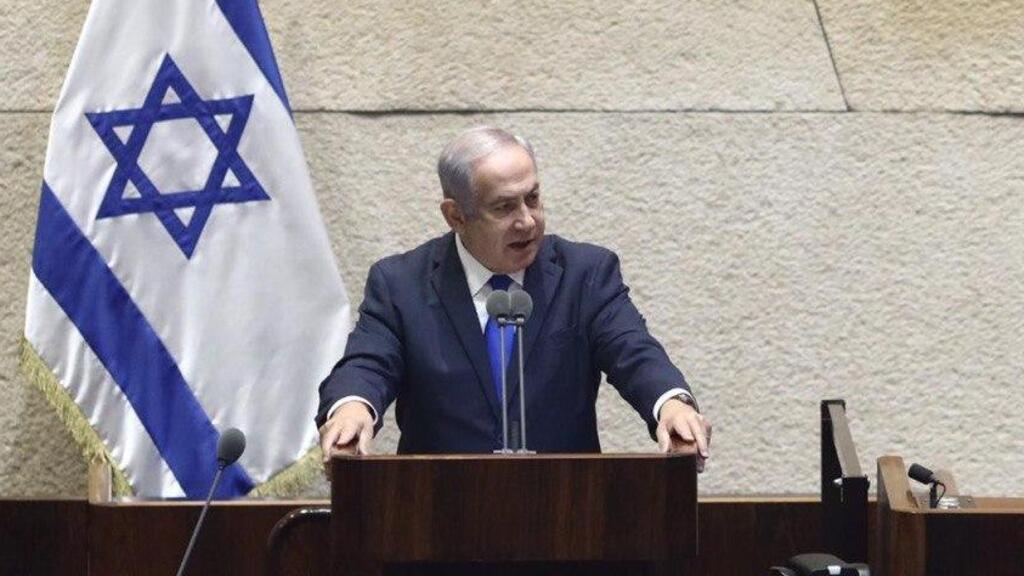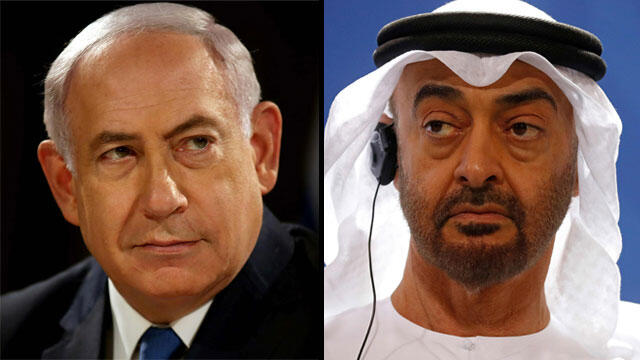Getting your Trinity Audio player ready...
The Knesset gathered for a festive session Thursday morning ahead of a vote to approve Israel's recent agreement to normalize ties with the United Arab Emirates.
The treaty was announced in August in a surprise statement by the White House.
4 View gallery


Prime Minister Benjamin Netanyahu and Emirati FM Abdullah bin Zayed bin Sultan Al Nahyan at the White House last month
(Photo: EPA)
The agreement was approved by the cabinet on Monday before being presented to the plenum for the parliamentary vote.
Presenting the details of the agreement to the Knesset, Prime Minister Benjamin Netanyahu again Thursday denied that the deal included a secret provision for the sale of advanced U.S. military tech to the UAE, despite confirmation from American officials.
"This is a day with few like it in the history of the country; a day when a peace agreement with an Arab state is brought for approval by the Knesset," the prime minister said in his opening remarks.
"We are presenting a peace agreement that does not contain secret addenda, it does not contain concealed appendices. Today we are tightening our relations with the Emirates and doing so during to our constant struggle against coronavirus," he said.
4 View gallery


Prime Minister Benjamin Netanyahu addressing the Knesset as it meets to approve the UAE deal
(Photo: The Knesset)
Defense Minister Benny Gantz said he applauded the prime minister commended the prime minister for "choosing to embark on the path to peace." and added that the defense establishment is engaged in maintaining Israel's qualitative edge and security interests.
"As long as I am Defense Minister, Israel's military power and qualitative edge in this region will be maintained, strengthened and further entrenched," he said.
Opposition leader Yair Lapid (Yesh Atid) said the peace agreement was a commendable achievement but Israel needs a leader that will make peace among Israelis.
"We are living here and not in the Gulf," Lapid said. "It is time for a leader that can forge peace at home, among Israelis. It is time for you to go," he told the prime minister.
Multiple lawmakers were expected to speak at the parliamentary session, local media reported, with the debate set to last for many hours.
The Joint List of predominantly Arab parties said Thursday morning that its 15 lawmakers would vote against the agreement.
"Replacing the principle of land for peace with Netanyahu's deceptive vision of peace for peace will bring disaster to the country and all its people. This approach ensures the continuation of the conflict, suffering and bloodshed," the Joint List said.
4 View gallery


Palestinians protest in Gaza in September against the normalization agreements between Israel, the UAE and Bahrain
(Photo: AFP)
The impact of the agreement has already been seen. On Wednesday, the first-ever Emirati commercial flight entered Israeli airspace in the wake of an open skies agreement with Jordan that followed the deals with the Gulf states.
Israeli airspace is now being used by a multitude of Arab countries, including Iraq, Qatar and Saudi Arabia, as part of the new aviation agreement between Jerusalem and Amman.
Meanwhile, Abu Dhabi Crown Prince Mohammed bin Zayed al-Nahyan said on Monday that he and Netanyahu had discussed strengthening bilateral ties and the prospects for peace in the region.
In an official statement that coincided with the cabinet vote approving the Sept. 15 agreements, Netanyahu said he and the crown prince would meet "soon", and had extended invitations to visit each other's countries.
According to source, the UAE delegation was expected to arrive in Israel on October 20 to discuss and finalize the details of the 18 separate normalization agreement.
The Emirate delegation will attend meetings at the Prime Minister's Office and the Foreign Ministry to finalize the deal.
4 View gallery


Prime Minister Benjamin Netanyahu and Abu Dhabi Crown Prince Mohammed bin Zayed al-Nahyan
(Photo: AFP)
Sources added at least "five or six" agreements are in advanced stages, including in the fields of investment, aviation, scientific-technological cooperation, visas and the establishment of embassies, which may be ready to be signed before the Emirate delegation arrives in the country.
UAE ministers of finance and economy are set to be part of the Emirate delegation.
Bin Zayed al-Nahyan, who is the de factor UAE ruler, is not believed to be part of the delegation and is expected to meet Netanyahu on a separate occasion, sometime before the U.S. elections in November.
Reuters contributed to this report
First published: 10:49, 10.15.20

